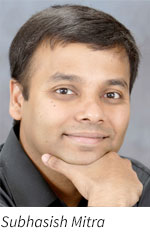Subhasish Mitra Receives Semiconductor Research Corporation Technical Excellence Award
Professor of electrical engineering and computer science honored for work on Quick Error Detection technology.
 Subhasish Mitra, associate professor of electrical engineering and of computer science, has received the Semiconductor Research Corporation (SRC) Technical Excellence Award for his research related to Quick Error Detection technology, which improves detection of flaws in hardware used in electronic systems.
Subhasish Mitra, associate professor of electrical engineering and of computer science, has received the Semiconductor Research Corporation (SRC) Technical Excellence Award for his research related to Quick Error Detection technology, which improves detection of flaws in hardware used in electronic systems.
Malfunctions in electronic systems have consequences ranging from computer crashes and loss of data and services to financial and productivity losses or even loss of human life. To ensure robust operation of electronic systems, it is essential to minimize the effects of design flaws in the hardware. Unfortunately, existing test and validation methods cannot cope with the complexity of today's integrated circuits and systems. As a result, many critical bugs are detected only after integrated circuits are manufactured. During post-silicon validation and debugging, manufactured integrated circuits are tested in actual system environments to detect and fix bugs in hardware. Existing post-silicon validation and debugging techniques are ad hoc and very expensive, and their cost and complexity are increasing faster than design cost.
Quick Error Detection (QED) technology overcomes post-silicon validation and debugging challenges by detecting bugs a billion times quicker compared with existing approaches while simultaneously catching critical bugs that would otherwise go undetected and severely jeopardize robust operation of electronic systems. QED also localizes difficult hardware bugs automatically in only a few hours so that the detected bugs can be fixed efficiently. In contrast, it might take days, weeks or even months of manual work to catch each bug using existing approaches. QED has been successfully used in industry.
"I am honored by this award from the SRC in recognition of the QED technology," Mitra said. "QED is key to ensuring robust operation of electronic systems we rely on everyday. My sincere thanks to the SRC for funding my research and for selecting the QED technology for this prestigious award. I am fortunate to work with an excellent group of highly-motivated undergraduate and graduate students at Stanford as well as fantastic collaborators from industry and academia. The QED technology would have been impossible without them. Finally, I also thank the NSF since the roots of this QED work started with support by the NSF CAREER award."
Publications by Mitra's group have received other awards including: the IEEE/ACM Design Automation Conference Best Paper Award, the IEEE International Test Conference Best Student Paper Award and the Best in Session Award at the Semiconductor Research Corporation's TechCon Conference.
The Semiconductor Research Corporation is a leading research consortium for semiconductors and related technologies, sponsoring university research and supporting elite students and faculty around the world. Selected by SRC’s 12 member companies and the SRC staff, award-winning faculty and research teams are recognized for their impact on semiconductor productivity through cultivation of technology and talent.
Last modified Mon, 13 Jul, 2015 at 14:32


